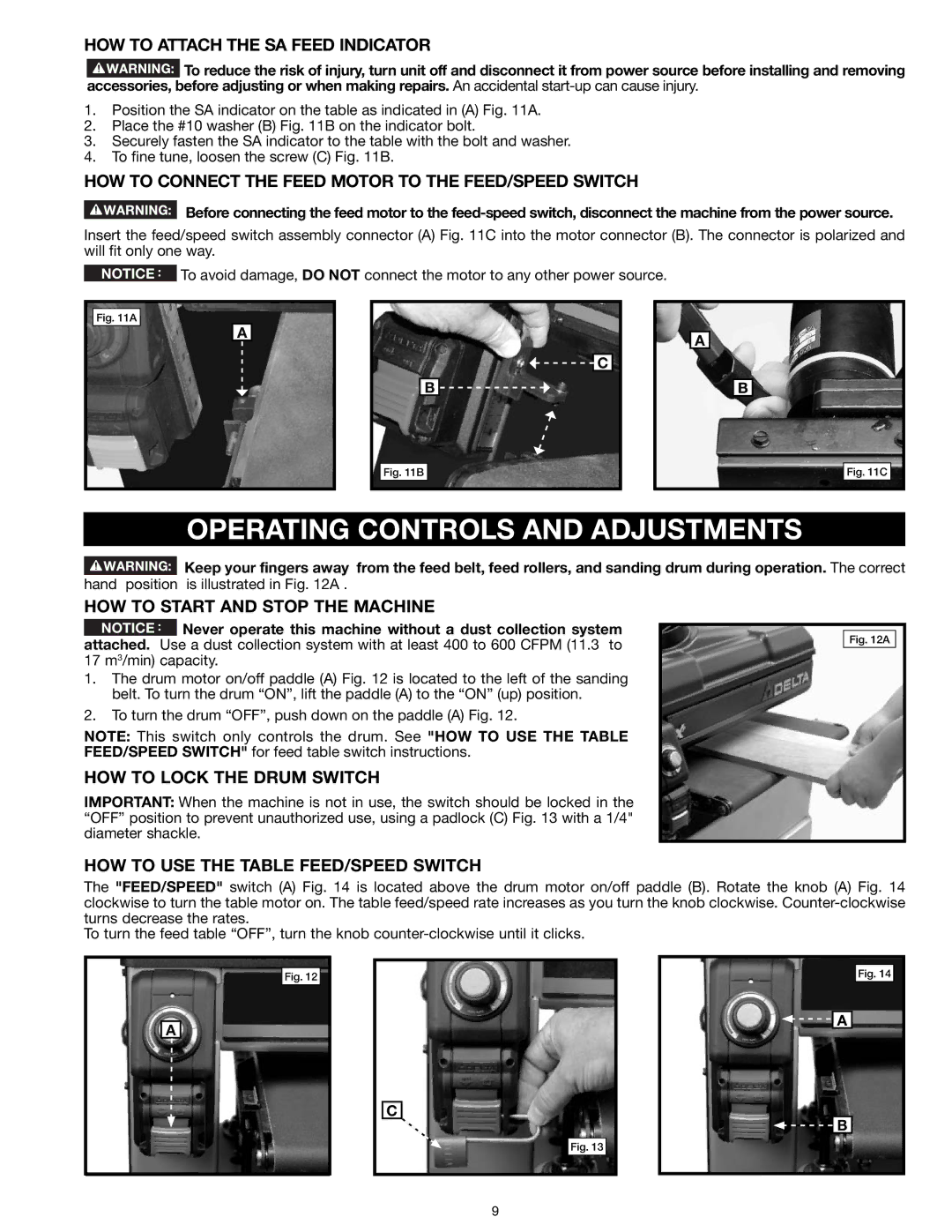
HOW TO ATTACH THE SA FEED INDICATOR
![]() To reduce the risk of injury, turn unit off and disconnect it from power source before installing and removing accessories, before adjusting or when making repairs. An accidental
To reduce the risk of injury, turn unit off and disconnect it from power source before installing and removing accessories, before adjusting or when making repairs. An accidental
1.Position the SA indicator on the table as indicated in (A) Fig. 11A.
2.Place the #10 washer (B) Fig. 11B on the indicator bolt.
3.Securely fasten the SA indicator to the table with the bolt and washer.
4.To fine tune, loosen the screw (C) Fig. 11B.
HOW TO CONNECT THE FEED MOTOR TO THE FEED/SPEED SWITCH
Before connecting the feed motor to the
Insert the feed/speed switch assembly connector (A) Fig. 11C into the motor connector (B). The connector is polarized and will fit only one way.
NOTICE ![]() To avoid damage, DO NOT connect the motor to any other power source.
To avoid damage, DO NOT connect the motor to any other power source.
Fig. 11A
A
![]()
![]() C
C
B
A
B
Fig. 11B
Fig. 11C
OPERATING CONTROLS AND ADJUSTMENTS
![]() Keep your fingers away from the feed belt, feed rollers, and sanding drum during operation. The correct hand position is illustrated in Fig. 12A .
Keep your fingers away from the feed belt, feed rollers, and sanding drum during operation. The correct hand position is illustrated in Fig. 12A .
HOW TO START AND STOP THE MACHINE
NOTICE | Never operate this machine without a dust collection system |
attached. Use a dust collection system with at least 400 to 600 CFPM (11.3 to 17 m3/min) capacity.
1.The drum motor on/off paddle (A) Fig. 12 is located to the left of the sanding belt. To turn the drum “ON”, lift the paddle (A) to the “ON” (up) position.
2.To turn the drum “OFF”, push down on the paddle (A) Fig. 12.
NOTE: This switch only controls the drum. See "HOW TO USE THE TABLE FEED/SPEED SWITCH" for feed table switch instructions.
HOW TO LOCK THE DRUM SWITCH
IMPORTANT: When the machine is not in use, the switch should be locked in the “OFF” position to prevent unauthorized use, using a padlock (C) Fig. 13 with a 1/4" diameter shackle.
HOW TO USE THE TABLE FEED/SPEED SWITCH
Fig. 12A
The "FEED/SPEED" switch (A) Fig. 14 is located above the drum motor on/off paddle (B). Rotate the knob (A) Fig. 14 clockwise to turn the table motor on. The table feed/speed rate increases as you turn the knob clockwise.
To turn the feed table “OFF”, turn the knob
Fig. 12
A
B
A ![]()
Fig. 12
C
Fig. 13
Fig. 14
![]()
![]() A
A
![]()
![]() B
B
9
